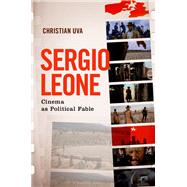
Sergio Leone Cinema as Political Fable
by Uva, ChristianBuy New
Rent Textbook
Rent Digital
Used Textbook
We're Sorry
Sold Out
How Marketplace Works:
- This item is offered by an independent seller and not shipped from our warehouse
- Item details like edition and cover design may differ from our description; see seller's comments before ordering.
- Sellers much confirm and ship within two business days; otherwise, the order will be cancelled and refunded.
- Marketplace purchases cannot be returned to eCampus.com. Contact the seller directly for inquiries; if no response within two days, contact customer service.
- Additional shipping costs apply to Marketplace purchases. Review shipping costs at checkout.
Summary
Looking at Leone and his films through a number of lenses, the book examines the elements of Italian history and identity interwoven in the director's stories, provides cultural context for a career spanning from Italy's fascist regime to Leone's death in 1989, and discusses the influences that formed Leone's directorial identity. Uva focuses in particular on the postmodernist theory behind Leone's works, revealing the critical basis of his stylistic and narrative innovations and newly analyzing the most iconic sequences from The Good, the Bad, and the Ugly (1967), Duck, You Sucker (1971), and Once Upon a Time in America (1984). An admirably thorough take on the man and his works, Sergio Leone: Cinema as Political Fable provides fresh perspective on a director long-established in cinema canon.
Author Biography
Christian Uva is Associate Professor of Cinema, Photography and Television at Roma Tre University. He has published at length on the relationship between Italian cinema, history, and politics, and on the image in the age of digital production. Among his publications are Schermi di piombo. Il terrorismo nel cinema italiano (2007), Cinema digitale (2012), L'immagine politica (2015), and Il sistema Pixar (2017).
Table of Contents
1. Sergio Leone's Short Century
1.1. A Childhood in the Shadow of the Regime
1.2. The Apprenticeship Years: Between National-Popular and Engaged Cinema
1.3. The Debut: From Myth to Historical Imagery
1.4. Leone's Road to Western
1.5. Engaged Cinema
1.6. From Director to Producer
1.7. From the 'Film of Films' to the Unfinished Project
2. Cinema Between Fable and Political Mythology
2.1. Political Spectacle
2.2. Postmodern as the 'Third Way'
2.3. World Metaphors and Thought Models Between Gramsci and Jünger
2.4. Repressing Fascism: Leone's Sword-and-Sandal Debut
2.5. The First Trilogy: Men With No Names and Subversive Dis-Identities
2.6. The Second Trilogy: Historical and Political Imagery in a Fable World
3. Three Sequences
3.1. Dislocations and Symbols Between Macrohistory and Microhistory
3.2. "Revolution Is an Act of Violence"
3.3. Voyeurism, Gender, Jewishness
An electronic version of this book is available through VitalSource.
This book is viewable on PC, Mac, iPhone, iPad, iPod Touch, and most smartphones.
By purchasing, you will be able to view this book online, as well as download it, for the chosen number of days.
Digital License
You are licensing a digital product for a set duration. Durations are set forth in the product description, with "Lifetime" typically meaning five (5) years of online access and permanent download to a supported device. All licenses are non-transferable.
More details can be found here.
A downloadable version of this book is available through the eCampus Reader or compatible Adobe readers.
Applications are available on iOS, Android, PC, Mac, and Windows Mobile platforms.
Please view the compatibility matrix prior to purchase.
